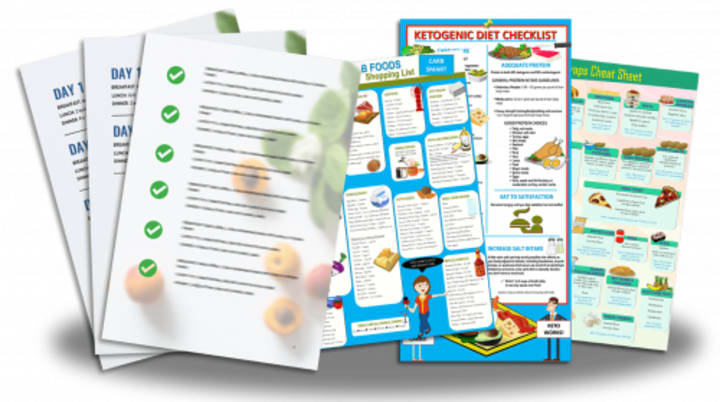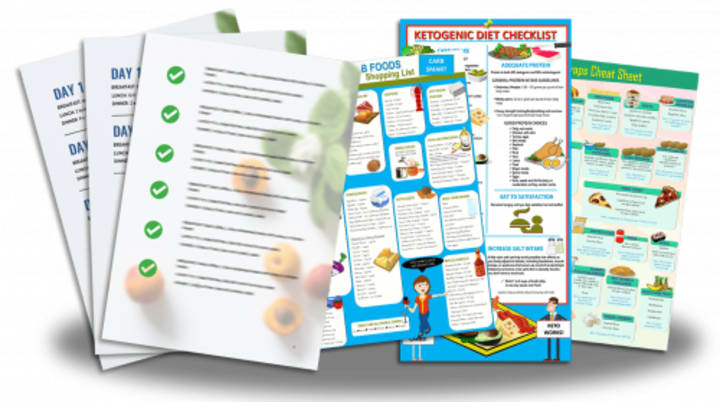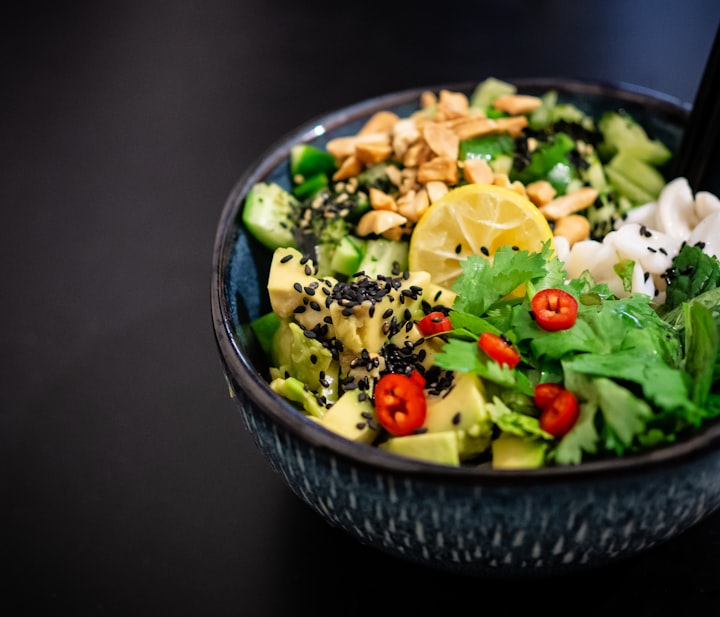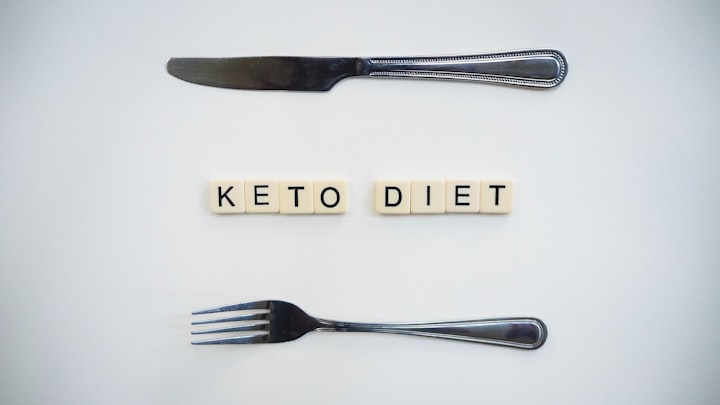How to create a keto diet plan that works for you
Learn how to lose weight in just few days
INTRO
The keto diet is a low-carb, high-fat diet that has become increasingly popular in recent years. It is a great way to lose weight and keep it off, as well as improve overall health. When following a keto diet, it is important to create a keto diet plan that works for you. This blog post will give you tips on how to create an effective keto diet plan that is tailored to your individual needs.
What is a keto diet?
A keto diet, also known as a ketogenic diet, is a high-fat, low-carbohydrate eating plan designed to put your body into a state of ketosis. Ketosis occurs when the body begins to burn fat for fuel instead of carbohydrates. This can result in rapid weight loss, improved mental clarity and physical performance, and various other health benefits.
The main focus of the keto diet is to reduce carbohydrate intake while increasing your intake of healthy fats and proteins. This shift in macro-nutrient ratios (the ratio of carbs, proteins, and fats) forces the body to rely on burning fat for fuel rather than glucose, which is derived from carbohydrates. As a result, the body starts producing molecules called ketone bodies that are used as an alternative source of energy.
A typical keto diet consists of eating foods high in healthy fats, such as avocados, nuts, and fatty fish; moderate amounts of protein such as lean meats, eggs, and dairy products; and very few carbohydrates from sources like grains, fruits, and starchy vegetables. By reducing your intake of carbohydrates and focusing on eating more healthy fats and proteins, you can enter a state of ketosis where the body burns fat for fuel.

30-Days Ketogenic Meal Plan
IF YOU ACT TODAY, YOU WILL ALSO GET ACCESS TO THESE BONUSES:
- Comprehensive Grocery-Ready Food List
- 77 Quick & Easy Keto Dessert Recipes
- 100 Keto Carb Alternatives
- Secret Bonus Report
PLUS:
- 60-Days Money Back Guarantee - No Questions-Asked
- Anniversary Special Discount
This Offer Could Expire At Any Moment!
Why might a keto diet be right for me?
The ketogenic diet is a low-carb, high-fat diet that has been gaining in popularity due to its effectiveness for weight loss and other health benefits. Many people find success with this eating plan because it helps them reduce their calorie intake while still eating satisfying, nutritious meals. On a keto diet, carbohydrates are limited to 20–50 grams per day, while fat is the primary source of energy. This approach has been shown to improve insulin sensitivity, reduce cholesterol, and promote weight loss.
For those looking to lose weight, the ketogenic diet can be particularly effective because it leads to a decrease in appetite and hunger levels. By reducing your carbohydrate intake and replacing it with healthy fats, your body is forced to burn fat for energy instead of relying on carbohydrates. This means that you can reduce your calorie intake without feeling deprived, leading to steady and sustainable weight loss over time.
In addition to its potential weight loss benefits, the ketogenic diet can also help improve cardiovascular health, mental clarity, and overall wellbeing. Because it reduces inflammation and balances hormones, this type of diet can be beneficial for those with diabetes or metabolic syndrome. Additionally, some studies have found that it may help reduce the risk of certain types of cancer.
Ultimately, whether or not a keto diet is right for you depends on your individual needs and lifestyle. If you’re looking for an effective way to lose weight and improve your overall health, it may be worth giving the ketogenic diet a try.
How do I create a keto diet plan that works for me?
Creating a successful keto diet plan can be daunting, but it doesn’t have to be! A keto diet is one that is high in fat, moderate in protein, and very low in carbohydrates. This type of diet encourages your body to enter a state of ketosis, a metabolic process in which your body uses fat as its primary source of energy instead of glucose.
Before you start on your keto journey, it’s important to plan ahead. Set yourself up for success by stocking your pantry with plenty of low carb meals and snacks. Low carb vegetables like spinach and kale, low carb fruits such as berries and melons, and low carb breakfasts like omelets or bacon are all great options. You may also want to consider trying some keto gummies, keto diet pills, or keto diet recipes for snacks or meals throughout the day.
Once you’ve stocked up on the basics, it’s time to create a meal plan that works for you. Make sure to include plenty of healthy fats, proteins, and low carb foods in your daily meals. Start with breakfast and make sure you have a few go-to meals that you can easily whip up before starting your day. For lunch and dinner, try to include low carb vegetables, proteins, and healthy fats. If you’re feeling creative, you can even create your own keto meals.
Overall, the key to creating a successful keto diet plan is to find meals that work for you and that you enjoy eating. With a bit of trial and error, you can make a plan that is sustainable and healthy for your lifestyle.
What are some foods to eat on a keto diet?
When it comes to a keto diet for beginners, the focus should be on low-carb, high-fat foods that are unprocessed and nutrient-dense. This means sticking to whole, natural foods like meat, fish, eggs, nuts, seeds, healthy fats and oils, non-starchy vegetables, and some low-sugar fruits. Here are some of the best food choices for a keto diet:
• Meat: Grass-fed beef, chicken, pork, lamb, organ meats, turkey
• Fish and Seafood: Salmon, tuna, shrimp, cod, trout, oysters
• Eggs: Free-range or pastured eggs
• Nuts and Seeds: Almonds, walnuts, macadamias, pumpkin seeds, chia seeds
• Healthy Fats and Oils: Coconut oil, olive oil, avocado oil, MCT oil
• Non-Starchy Vegetables: Broccoli, cauliflower, asparagus, spinach, kale
• Low-Sugar Fruits: Avocados, tomatoes, olives, raspberries, blueberries.
These foods should make up the bulk of your diet if you’re following a keto diet. Eating plenty of healthy fats and proteins helps to keep you satiated and your energy levels steady. It’s important to remember that the key to success with a keto diet is to eat the right amount of protein and fat for your body. If you’re unsure about what is keto diet and how much of each macro you should be eating, you may want to consult with a nutritionist or doctor who can help you create an individualized plan.

30-Days Ketogenic Meal Plan
IF YOU ACT TODAY, YOU WILL ALSO GET ACCESS TO THESE BONUSES:
- Comprehensive Grocery-Ready Food List
- 77 Quick & Easy Keto Dessert Recipes
- 100 Keto Carb Alternatives
- Secret Bonus Report
PLUS:
- 60-Days Money Back Guarantee - No Questions-Asked
- Anniversary Special Discount
This Offer Could Expire At Any Moment!
What are some foods to avoid on a keto diet?
The keto diet is a low-carb, high-fat diet that helps your body burn fat for fuel instead of carbs. To follow the keto diet successfully, you’ll need to avoid certain foods. Here are some of the common foods to avoid on a keto diet:
1. Grains and starches: Many grains and starches, like wheat and oats, are high in carbs, so they should be avoided on a keto diet. This includes all types of bread, pasta, rice, potatoes, and corn.
2. High-sugar fruits: Fruits can be high in sugar, so it’s best to avoid fruits like bananas, mangoes, grapes, and pineapples. Low-sugar fruits like berries and citrus fruits are better options.
3. Sugary drinks: Sugary drinks like soda and fruit juice are loaded with sugar and calories, so you should avoid them when on a keto diet.
4. Processed foods: Processed foods like cookies, cakes, and chips are usually high in carbs and unhealthy fats, so they should also be avoided.
5. Refined vegetable oils: Refined vegetable oils like soybean oil and corn oil contain unhealthy trans fats and should be avoided on a keto diet. Healthy fats like olive oil or avocado oil are better choices.
What are some common mistakes people make when starting a keto diet?
Starting a keto diet can be a great way to jump-start your health and fitness goals, but if you’re not careful, you could be setting yourself up for failure. Here are some of the most common mistakes people make when beginning a keto diet:
1. Not eating enough fat. A key component of the keto diet is consuming a high-fat diet, so it’s important to make sure you’re getting adequate fat in your meals. Eating too much protein can kick you out of ketosis, so make sure you’re getting plenty of healthy fats from sources like avocados, nuts, and seeds.
2. Not eating enough fiber. Fiber is essential for good gut health, and the keto diet can sometimes be low in fiber. Make sure you’re eating plenty of low-carb vegetables like kale and spinach, as well as high-fiber nuts and seeds like chia and flax.
3. Not tracking your macros. Tracking your macros (or macro-nutrients) is one of the best ways to ensure that you’re staying in ketosis. Without tracking, it can be hard to know exactly what you’re eating and how many carbs you’re taking in.
4. Not drinking enough water. Staying hydrated is key for any healthy diet, but especially when following a keto diet. Make sure you’re drinking plenty of water throughout the day to help with digestion and to avoid dehydration.
5. Eating too much processed food. Processed foods may be convenient, but they’re usually loaded with added sugars and carbohydrates that can kick you out of ketosis. Try to focus on whole foods like vegetables, lean proteins, and healthy fats to ensure you stay on track.
By avoiding these common mistakes, you can ensure that your keto diet is successful and helps you reach your goals. Good luck!
What are some tips for succeeding on a keto diet?
1. Plan your meals ahead of time: Planning out your meals for the week can help you stay on track with your diet and make sure you’re eating the right foods. Meal planning can also save you time and energy throughout the week.
2. Start off slow: If you’re new to the keto diet, it’s important to ease into it. Start by eating fewer carbs and increasing your healthy fats and protein. This will help your body adjust to using fat as its primary source of energy.
3. Eat more low-carb veggies: Eating plenty of low-carb vegetables is essential for getting all the necessary vitamins and minerals you need while still keeping your carb count low. Be sure to include a variety of vegetables in your meals such as broccoli, spinach, kale, cauliflower, and peppers.
4. Don’t be afraid to experiment: One of the great things about the keto diet is that it allows you to experiment with different ingredients and flavors. Try adding spices to your meals or experimenting with alternative types of protein such as tofu or tempeh.
5. Stay hydrated: It’s important to stay hydrated when following the keto diet. Drink plenty of water throughout the day and avoid sugary drinks like soda and juice.
6. Monitor your progress: Tracking your progress is a great way to stay motivated on the keto diet. Consider keeping a food journal or tracking your weight loss progress over time. This can help you stay on track and make sure you’re reaching your goals.

30-Days Ketogenic Meal Plan
IF YOU ACT TODAY, YOU WILL ALSO GET ACCESS TO THESE BONUSES:
- Comprehensive Grocery-Ready Food List
- 77 Quick & Easy Keto Dessert Recipes
- 100 Keto Carb Alternatives
- Secret Bonus Report
PLUS:
- 60-Days Money Back Guarantee - No Questions-Asked
- Anniversary Special Discount







Comments
There are no comments for this story
Be the first to respond and start the conversation.